#spiritually i am this interviewer
Text
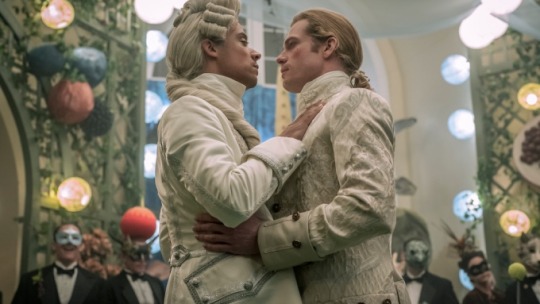
It’s about the hand placement
#they’re killing me here#they’re also INCHES away from kissing like#i’m so 😭#spiritually i am here until season 2#interview with the vampire#lestat de lioncourt#louis de pointe du lac#loustat
89 notes
·
View notes
Text
prince lestat and the realms of atlantis rules
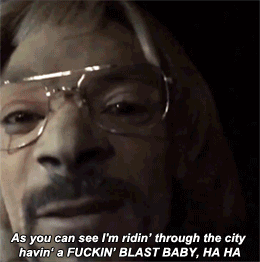
#anne rice when will i be on your level emotionally intellectually spiritually etc#vampire chronicles#interview with the vampire#also fareed in the show.... love him so much#also also dubai has to be trinity gate in the show am i right or am i right
3 notes
·
View notes
Text
bite bite kill kill!!!!!!!!
#spiritually i am shredding something to fucking ribbons#anyway despite me putting in my application TWICE that im moving states at the end of the summer i got to the interview and a minute in the#poor woman realized i didnt put that shit in as a prank. so now weve both wasted our time#its not her fault of course but seriously i took all the precautions here#kazoo noises
1 note
·
View note
Photo


Locker Room Raw: Brad Marchand - Nov 19, 2022 - “How's the face feeling?”
“Sore. Swollen. My tongue’s swollen, but feels good. It was a stick, yeah, I think Bergy was mad at me. I missed the backdoor tap-in and he gave me a shot.”
#brad marchand#anyway I am being totally normal about an interview where he spends half the time fidgeting his swollen tongue 👍#boston bruins#spiritual successor to when bergy accidentally punched him in the face during a scrum lmfao#brad marchand thirst power hour
5 notes
·
View notes
Text
Battinson Guest Starring on TV Shows
SO
For someone who holds the title of Richest Man in the World, Bruce doesn’t do a lot of traveling.
Which is to say he does a LOT of traveling, but he always tries to find a way out of it.
(Are there bat-related reasons for this? Are there people-related reasons for this? Are there anxiety-related reasons for this? Who knows?)
But partners and sponsors aren’t always going to tolerate his hermit-like tendencies. So once every month or so, Alfred wrangles Bruce into a private jet and sends him off to who knows where so he can represent the company.
Usually, it’s somewhere close on the East Coast, maybe it’s across the pond, even Asia isn’t off the table, but the rarest place to spot Bruce Wayne is actually the West Coast of the US.
One day, it is announced that Bruce Wayne will be spending two (count ‘em, 2) consecutive weeks in California with his kids for some grand business convention.
The West Coast media goes feral with the news, ESPECIALLY interviewers. And because Bruce kicks up such a fuss this time, Alfred has the gall to sign him up for FOUR TV appearances.
Here are these appearances :)
RuPaul’s Drag Race
Drag Queens, especially Drag Race all-stars, contribute to a wide variety of charities
So on a new episode, the queens are challenged to design and shoot a promotional ad for their own charity
And who better to act as a guest judge for this episode than the show’s largest benefactor, CEO of the Wayne Foundation, Bruce Wayne?!
Physically? He’s older than half of the contestants. But spiritually? He screams Baby Gay.
Fifteen minutes into the episode, Bruce is welcomed into the werkroom where he gives them pointers on their campaign. He’s in his cute little three-piece suit (Alfred’s idea) with the intention of looking put-together and knowledgeable. But that’s not the only outcome.
They all flirt with him. Everyone, single or taken. The confessionals are so thirsty.
“He’s lucky the cameras are on. Otherwise, I’d eat him up faster than a bachelorette party in a buffet line.”
“My celebrity crush is talking to me, and all I can focus on are his gorgeous eyes. How am I supposed to know what he's saying?”
Of course, they shoot their shot, but most of it is joking since they don't know he's bi yet.
“Are you single, honey?” Bruce blushes. “It’s complicated.” “Well, I’ll make it simple for you.”
We all know this man can't handle being flirted with. We saw how he froze when Selina did it. It’s like he mentally bluescreens when someone calls him a pet name.
Only THEN do they learn he's bi
One of the queens jokingly asks him, “Ever been with a man before?” thinking it would be a firm no, but Bruce says, “Actually, yes.” “Oh shit, really?” And to Bruce’s embarrassment, the whole room hears him.
The flirting is thus taken up a notch.
On the main stage, Bruce has a lot of great constructive criticism. He talks about how to find the right audience, the importance of a good slogan, and even goes on a little rant about logo design.
(You cannot convince me that Bruce hasn’t hyperfixated on the business of charity work before. Or the science of marketing. They’re his favorite business topics.)
After about three minutes of him complimenting one contestant for their Drag Library pitch, he stops himself mid-sentence and says, “Oh sorry, am I talking too much?” “No, please! Keep talking, sweetheart.” Bruce covers his face to hide his blush. “Why is everyone flirting with me?” “Baby, have you seen yourself?”
While the judges deliberate, RuPaul mentions Charisma, Uniqueness, Nerve, and Talent. Bruce nods along for a while then suddenly just blurts out, “Wait, does it spell ****?”
The judges pause then burst out laughing. “Oh no, we’ve traumatized him!" Bruce is blushing up a storm. “I just never thought about it like that!” “Sweet, innocent Bruce. We’re so sorry.”
It’s later revealed that Bruce offered to help some of the queens launch their charity projects through the Wayne Foundation.
It’s v cute 🥰
Nailed It!
I love Nicole Byer.
She is Mother.
In all seriousness, she’s so fucking funny and she’s personable enough to pull Bruce out of his shell a bit.
The theme for this episode is Found Family. Three pairs of family members compete together—a gay father and his adopted son, an aunt who adopted her niece, and a stepfather and stepdaughter.
Because Bruce Wayne famously adopted two children, he is invited to guest judge.
So Nicole opens the episode with a zinger, the contestants are introduced, and Bruce is welcomed onto the judge’s panel beside Nicole and Jacques.
(Yes, Bruce does speak French. Yes, Nicole makes a joke about it being hot.)
Nicole: “We were surprised you accepted our invitation, Mr. Wayne. You’re notorious for staying on the East Coast. What brought you to the Nailed It! Studio?” Bruce: “My children love this show. They always tell me I should be on it since I’m so bad at baking.” Nicole: “Really? Maybe we should do a celebrity season of Nailed It! and have you compete.” Bruce: “No, you should not.”
Nicole: “So, Bruce, I know you have a butler at home who bakes for you. But what’s the grossest thing you’ve eaten? Escargot? Bad caviar?” Bruce: “I drank olive oil straight from the bottle once.” Nicole: “…What?”
The problem for Bruce is he can’t say anything bad. It just feels mean :(
(And he would rather jump into oncoming traffic than gamble with a social interaction)
For the first challenge, the contestants make cake pops. But when Bruce tries the first one, there is a sickening crunch. Bruce’s eyes widen for a second and he slowly chews.
Nicole: “What was that? Bruce, are you okay?” Bruce, clearly struggling: “It’s…good.”
“Bruce, you can spit it out. It’s okay.” “I already swallowed it.” “Oh, you poor thing.” Bruce chokes for a second, and Nicole pats his back. “Please don’t die. We can’t afford it.”
For the big challenge, production has a surprise in store for Bruce.
Dick (9) and Jason (7) run onto the set and smother Bruce with a hug.
It’s adorable. Bruce no longer cares about paying attention, okay? His kids are here :D
The two boys read from cue cards to announce the second challenge: a three-tiered Gotcha Day cake. And as per tradition, the winner of the first challenge gets a leg-up.
This time, it’s a Helping Hands Button. When they hit the button, Dick and Jason will run over and help them for three minutes. (While being supervised, of course.)
As the contestants bake, Nicole says hello to Dick and Jason, who are clambering all over Bruce like a jungle gym. They both shake her hand and talk about how they love the show.
Nicole looks pointedly at the two empty chairs beside Bruce. “You know, we brought these chairs for you two to sit in.” Dick, on Bruce’s shoulders: “We’re fine, Ms. Byer!” Nicole: “Ms. Byer? Oh, you’re a cutie, aren’t you?”
Just ten minutes before the challenge is over, the Helping Hands button is pressed, and Dick and Jason are given stools so they can help the aunt and niece stack their cake tiers.
Two minutes in, the aunt instructs them to let go of the cake. But the moment Jason pulls his hands away, the cake topples over and covers him in frosting. Jason, whispering: “Oh f*ck.” Bruce: “Jason!” Jason: “I didn’t say that! Dick did!” Nicole: *cackling as Bruce buried his face in his hands*
Jason gets cleaned up, and Dick helps them stack what can still be salvaged.
When Wes brings out the trophy, he’s dressed as Batman. Dick and Jason gets a kick out of that.
Celebrity Family Feud
Bruce was invited to the show after his SNL skit went viral a few months ago
This episode, the teams are split up by cities they grew up in. Gotham v. Star City. Naturally, his team is playing for the Wayne Foundation.
It’s a pretty odd cast of people, most of them having moved to LA or Hollywood. Bruce is the only one to still live in Gotham.
They have fun, though, despite their limited common ground. The audience has a few good laughs.
(Some at Bruce's expense)
Harvey: You're a very wealthy man, Mr. Wayne. What do you really do in that tower all day? Bruce: I, uh…business? Harvey: …You business. Bruce: ……Wait-
All in good fun. Bruce just vibes in his little corner until he needs to answer a question. It's pretty chill.
For exactly half of the episode.
Then it happens.
Steve Harvey takes two people from each team up to the buzzer and says, “We asked 100 people: Name something your parents always told you as a kid.”
What the production failed to consider is how this particular question might be a sensitive topic for some contestants.
Bruce’s team gets the question, and Steve saunters up to Bruce, completely oblivious.
“Alright, Bruce Wayne!” Bruce nods awkwardly. “Hi, Steve.” “Bruce, what’s wrong? You’re looking a bit uncomfortable.” “…I don’t like this question, Steve.” “Why not?” Bruce just gives him a desperate look, and it clicks. “Oh! Oh my gosh!”
Let’s be real. Bruce is awkward enough, but Steve Harvey cannot save an awkward moment for his life either.
But he tries his best anyway and asks, “Are you okay with answering this question, or would you like to pass?” Bruce nods frantically. “I can answer. ‘I love you.’” “I love you too, Mr. Wayne.” “No, uh, my answer is ‘I love you.’” “Oh! That’s a good one.”
Thankfully, the audience erupts in laughter. That little interaction cuts the tension, and Bruce’s answer ends up on the board.
And by god, the memes
“I love you too, Mr. Wayne” is the new “Enjoy your meal.” “You too.”
The audio clip of “I don’t like this question, Steve” goes viral on TikTok
Someone gets a pic of Bruce and Steve looking at each other with palpable fear in their eyes, and it makes its rounds all over Twitter
10/10 never again
Running Wild with Bear Grylls
Now this is the most challenging. Not because it’s difficult, of course. But because Bruce has to look stupid enough to maintain his Brucie Wayne persona but smart enough to keep himself safe.
For this episode, Bear takes Bruce to the California desert.
“How much do you know about survival, Bruce?” Bear asks. Bruce nods carefully. “I did some survival training once with a friend from boarding school.” “Oh really, how did you do?” “Fine, I think.”
This is, of course, his way of saying I trained with a league of assassins for years, but Bear can’t know that! And that’s how most of the episode goes.
Thank god Bruce's fear of being caught is mistaken for being scared of the physical challenge because every time Bear points out how well he’s doing, he breaks into a sweat.
Bear: For a businessman, you’re surprisingly fit. Bruce, sweating bullets: Oh, this is all just for show.
Bear: Wow, you’re a natural. Are you sure you’ve never set up a zip-line before? Bruce, gripping his equipment so tight he gets rope burn: I think it’s just the survival instincts.
Of course, he pretends to be out of breath a few times. The Drama.
Bruce, pretending to slip and fall: Ouch! Who knew the outdoors were so dangerous? Bear, you are crazy. Bruce, internally: How much longer are we doing this?
Bruce being a vegetarian is actually a point of contention. You see, Bear always makes their celebrity guests do something crazy for food like skin a snake or eat a mouse. Scavenging for berries just doesn’t grab the audience’s attention.
But do you know what is vegetarian?
Bear: Now, in extreme cases of survival, it’s not rare for humans to resort to drinking their own pee. That’s what we’ll be doing in a moment. Are you up for it? Bruce, visibly repulsed: I’ve had Gotham tap water. I’ll be fine.
How on God’s Green Earth did Alfred convince him to do this?
To get to the extraction point, Bear takes Bruce down a cliffside.
Bear shows Bruce the meticulous process of properly belaying from the top of a cliff, and Bruce, who has done this over 100 times is like, “Wow that’s so dangerous :( Will we be okay?”
He really tries to ramp up his acting skills this time.
(Little does he know that’s not necessary.)
Bruce goes down first as Bear belays with a cameraman filming from the top. Halfway down, Bruce hears a scuffle, and the cameraman yells, “F*ck!”
Bruce looks up, arms already out for protection, and he sees a small disk falling towards him. It’s the lens cap. He catches it on instinct.
For a second, he thinks, “Shit, was that too skilled? That’s not enough to make people think I’m Batman, right? I just caught it in midair while dangling from a cliff. That’s totally not weird and suspicious. Normal people do that—“
Then Bear yells, “Bruce, drop it!” Bruce looks up at Bear, confused. “Why?” “There's a scorpion!” That’s when Bruce looks at the lens cap and sees a black scorpion perched on top with its tail ready to strike.
They don’t have those in Gotham.
Bruce jumps in his harness and flings the cap at the rocky cliffside. He hears a crunch, and the scorpion and cap tumble to the ground. Bruce frowns. Can a scorpion survive that drop?
“You just killed a scorpion, mate!” Bear cries. Bruce looks up in horror. “I killed it?!” “Hell yeah!” Bruce’s face falls. “No!”
Because oh. shit.
Bruce just killed something. The sad, orphaned vegetarian just killed a scorpion.
Bruce has a meltdown.
He didn’t mean to kill it!!!! Oh no, he just killed an innocent little creature. Yeah, he punches people for fun sometimes, and he definitely put a few violent criminals in the hospital, but he’s never committed MURDER!!
This poor little scorpion died due to his own negligence, and he feels so so so bad about it.
Bruce is a mess as he climbs the rest of the way down.
Bruce, cradling the scorpion’s body: I don’t know how to perform CPR on a scorpion! Bear: Bruce, you took its head clean off. Bruce: *sad noises*
Legit inconsolable. To him, it’s like he just murdered a puppy
Once they're out, Bear is trying to cheer him up. Bless him.
Bear: We’ve conquered the wild! Haven’t we, Bruce? Bruce, head between his legs, still mourning the scorpion: I’m never going outside again.
Yeah, no one’s going to think he’s Batman after that.
And that's all four of Bruce's TV appearances from the West Coast :) Dick and Jason never let him live any of it down. Alfred is almost sorry. (He is not sorry.)
Let me know your thoughts! What other TV shows do you think Battinson would appear on as a guest?
Okie dokie :D Love y'all! Have a good day <3
#RIP scorpion#bruce donates $10 million to the preservation of California wildlife to atone for his sins#battinson#bruce wayne#batman#the batman 2022#batman 2022#the batman#battinson needs a hug#dc universe#soft bruce wayne#gotham#rupaul's drag race#nailed it#celebrity family feud#running wild with bear grylls#dick grayson#jason todd#alfred pennyworth#long post#long long post
2K notes
·
View notes
Note
I fell into the Shen Yun/Fa Lun Gong trap and am so mad at myself for that. Scale me on stupidity and warn your followers, they gotta hear it.
I would not call victims of cults stupid so therefore be free of the scale!! Reasonable and intelligent people are still susceptible to falling into cults, falling for scams, MLMs, etc. If you do not know much about anything related to Falun Gong's beliefs or the stories they tell (cough make up coughcough) through Shen Yun, then it is easy to get reeled in.
It doesn't help that a lot of the English language info that pops up when you Google Falun Gong/Shen Yun is positive, to the point that even the Falun Gong Wikipedia page paints them as a mostly innocuous spiritual group persecuted by the Evil CCP. They really like to play up this angle, by the way, and sadly for many people in the west, they hear the part where they're forbidden by the CPC and think that automatically means Falun Gong is good and everything they say must be true.
Anyway.
Here are some pieces for others to look at if you're interested and haven't seen them yet:
Video sources
if you're an audio/visual person.
Personally I think the papers/articles are more informative and less annoying (The second video is a video essay whose creators I can only describe as "probably spend a lot of time on liberal Twitter" and "clearly learned everything they know about China from Reddit")
youtube
^2020 release date (https://www.youtube.com/watch?v=QzlMQyM8p74) ↳ Includes interviews of both Falun Gong and former Falun Gong figures. If you're like me, the condescending Englishman POV will make you roll your eyes at least once.
youtube
^2021 release date (https://www.youtube.com/watch?v=QzlMQyM8p74) ↳ sort of gives an overview about Falun Gong from an outsider POV, but the narrator uncritically repeats some of the persecution claims made by Falun Gong (esp. the organ harvesting claims, which are most likely not true imo), and by Amnesty International...via Falun Gong advocates. I honestly wouldn't bother to link this video as a source except it seems like one of the bigger ones that show up in a Youtube search, and they do touch on a lot of sources. Their research just seems really shallow and their commentary on the issue is rudimentary to the point of being unnecessary tbh.
Papers/Articles
ExposingTheFalunGong.org (via wayback machine), a website created by the child of former members ↳ This site includes more description of actual belief, which might better inform you on why they are/can be harmful
Stepping Into the Uncanny, Unsettling World of Shen Yun (The New Yorker, 2019)
The Obscure Newspaper Fueling the Far-Right in Europe (The New Republic, 2019) ↳ This is mostly about The Epoch Times, which is a Falun Gong funded newspaper and mouthpiece.
A Burning Faith in the Master: Interpreting the 1.23 Incident (paper hosted by JSTOR, 2018) (Google Drive link if you're out of JSTOR articles this month) ↳ The 1/23 Incident was an incident where multiple Falun Gong practitioners interpreted words by Li Hongzhi (FLG's founder) to mean they should self-immolate at Tiananmen Square
2K notes
·
View notes
Text
Misunderstanding Lucifer from the Sandman series and why Gwendoline Christie is the right choice (an art historian and occultist's opinion)
I am writing this post as I'm absolutely baffled by the issues people seem to have with the portrayal of the character of Lucifer in the Sandman series. For some reason people find it problematic that the fallen angel is played by Gwendoline Christie, a powerful and androgynous-looking woman, but there is seemingly no problem with Lucifer being played by a black-haired man in the nightclub business (Tom Ellis in the Netflix series 'Lucifer'). Don't get me wrong, Tom Ellis is entertaining and wonderful to watch, but that particular version of Lucifer is neither canon when it comes to the comics nor does it have anything to do with the actual angel Lucifer.
Angels are genderless beings and they have always been portrayed as androgynous in the history of art. Multiple literary sources, including grimoires (books with supposed instructions on how to summon these beings and many others), state that angelic beings as well as demons are able to change their appearance. Many of those forms they might take aren't even humanoid and they can choose not to show any physical form at all. They aren't corporeal beings, the fact that they do take on any resemblance of a physical form is just so humans can understand them better. That's why we've been painting them as human-like ever since the early times of human civilization. What we make to be similar to us is what makes it comprehensible. Portraying beings from other dimensions/realms as human-like but with androgynous features is a way to show they don't belong in the physical dimension, as gender is likely a non-existent concept in other realms of existence. Androgyny of mythical beings, therefore, emphasizes the fact they are different than physical beings such as humans.
Therefore, when portraying an angelic being in art, or in any type of media, making them androgynous is making way for their essence to come through. In a way, the same applies to the way elves are portrayed as ethereal and androgynous since they don't have to be corporeal beings at all, at least when it comes to folklore. I know this opinion might not be understandable to others or it might sound controversial, but I believe that not portraying an angelic being as androgynous and not showing any signs of their divine origin (these include mannerisms that emphasize their etheriality for example, a cadence in their voice that is different etc.) is a huge missed opportunity that might rob these interesting mythical beings of what they are. Not making angels feel like angels beats the point of having an angel character (in a movie, series or video game for example) in the first place.
This is why Gwendoline Christie is the right choice. At a height of 6′ 3″ (1.91 m), captivatingly pale. androgynous with a powerful specific sort of grace and presence - a perfect 'vessel' for the Morning Star. What's more, she understands the importance, complexity, grandeur and the mythical dimension of the figure of Lucifer, as well as the whole 'spirituality' of the Sandman universe which is rather evident from her approach to this role and the interviews she has given so far. I might go so far to say that, even though the Sandman series isn't even out yet (though there is some footage available already), the casting of Gwendoline as Lucifer feels right just as the casting of Lee Pace as Thranduil in the Hobbit felt right and I consider the character of Thranduil to be the best portrayal of a humanoid mythical being on TV. Lee felt like an elven king, moved like an elven king, spoke like an elven king and radiated an energy of the dimension the elven king might have come from (I'm talking about the folkloric 'Otherworld' where elves supposedly live). I feel the same might apply to Gwendoline and Lucifer.
As an occultist, art historian, anthropologist and someone who is rather fond of the figure of Lucifer, I am looking forward to seeing how Gwendoline interprets him. Finally, we might get something completely different from a frequently portrayed 'demonic' side/version of this important mythical character. We might just see the Light Bringer who has not forgotten his divine origin.
- Heidi (@theatrum-tenebrarum)
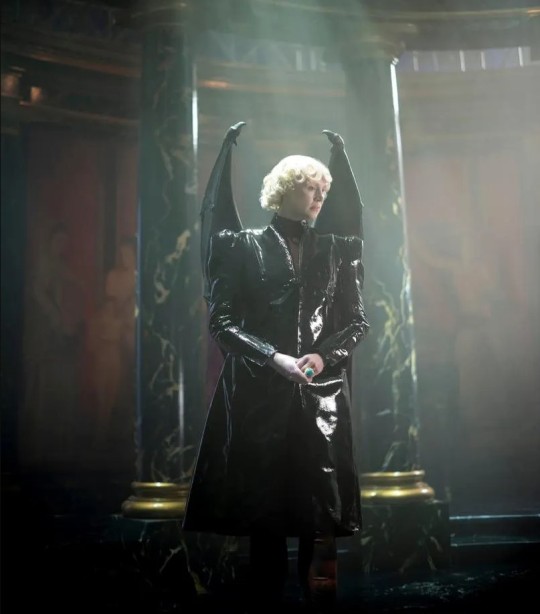
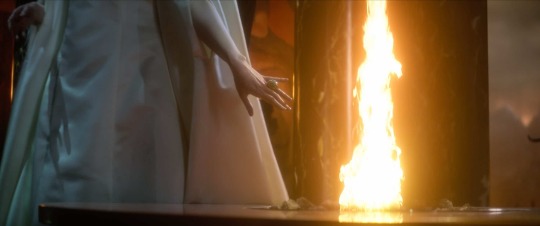

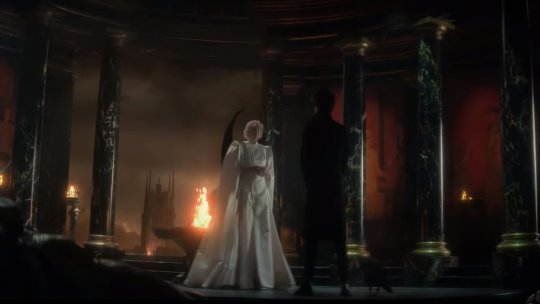
Gwendoline Christie as Lucifer (The Sandman series on Netflix, out 5th August 2022)
#lucifer#lucifer morningstar#thesandman#sandman#mythology#arthistory#angels in art#characters#neil gaiman#gwendoline christie#comics#thranduil#elves#folklorist#luciferian#occult#occultism#witch#magick#esoteric#myths#myth#folklore#rant#gender#netflix#netflix series#anthropology#androgyny#theoccultinpopularmedia
6K notes
·
View notes
Text
𝔱𝔥𝔢 𝔢𝔫𝔦𝔤𝔪𝔞 𝔞𝔯𝔠𝔥𝔢𝔱𝔶𝔭𝔢

[I AM FOLLOWING AYESHA K.FAINES RESEARCH OF FEMININE ARCHETYPES]
↳ the sexual feminine archetype of the mystic archetype.

♇ when your percentage of the lover percentage is 70% and over. and when your personal score matches with your percentage engima the most.
♇ the enigma is one of the sexual feminine archetypes that belong to the feminine archetype the mystic, whereas the other sexual feminine archetype is the goddess.
♇ people who belong to the enigma archetype are perceived as earthy and have this mesmerising and magnetic energy that can be depicted as positive.
♇ some of them could be seen as very aloof and can have a resting bitch face. they're spiritual people and positive enigmas have a hard time being narcissistic and cold.
♇ they're people who dont necessarily need fame or attention, [they just focus on what they create and people are attracted to], these women are more focused on their inner peace.
♇ they are people who feel like they need to connect to a higher source of power, its comforting for them to know that there is something bigger than them that they can be lenient on.
♇ since they're people who like peace so much, they could have this tendency of fleeing from situations when they recognise that trouble would be led to them in the end. they're women who are likely to have a sense of high value of themselves and to reach that, they like to ground their energy.
♇ when it comes to romance, they like to make their lover feel seen and heard. enigmas are HUGE lovers, and most of them express their love for them within their music. like when i was writing the enigma post, fka twig's song, pendulum kept on playing in my head.
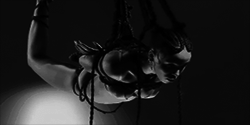
♇ the lyric "dying to be yours" repeated in my head, sometimes, enigmas are the type of women to drop everything to be and please their significant other. the link to the song :)
♇ they can sometimes overlook their lover's very bad flaws, and can be the type of people to be into open-relationships.
♇ when it comes to non-romantic situations, or in general, they're people who keep a big part of themselves only to themselves, they don't like the idea of people knowing about them 100%.
♇ as it comes to people interacting with them, people might give them the burden of having to fix them.

♇ they can get into episodes where they have a lot of blockages when it comes to expressing their sensuality or creativity. enigmas are the type of people to live in their head than executing their ideas.
when it is not blocked you'll find them to be people with very artistic and original.
♇ though, enigmas come in many forms, even though they are people who can love very deeply, they're also very closed off women. watching interviews of them, most of them have reminded me of manic pixie girls.
♇ they're women who are very strong with their opinions, and since they're strong about their thoughts they can be very poetic. they're woman who can easily express their feelings so people can understand where they are coming from.
♇ when around the right people, they can come off as very chatty but they're the type to speak about everything but themselves.
♇ i have noted that many of them do know how to sing, i've implied that they're creative and enigmas are likely going to be those who take the musician route.
♇ are aware of how society and how poorly it treats people, so they try and help others, [and the earth]. they're people who always like to be prepared and can be considered as very cute. they have this earthy energy to them but still like to indulge in luxury, chiefly for their jewellery.
♇ they like to nurture things so they are the type to get plants or even pets. [and as a stretch could be open to having kids].
♇ when enigmas are really in love with someone or just take a liking too much for a person, they can become very agreeable people, they sometimes become a walking mat or you could say people-pleaser.
♇ after watching tons of interviews many of them do have a raspiness to their voice, could sometimes be because of weed. or just smoking in general.
♇ as it comes to their aesthetic, i have observed many of them like neutral colours and are into self-care. the type to have many skin products.
♇ scent/senses is very important for them and they tend to be very hygienic people.
♇ out of all the feminine archetypes, enigma archetypes are the ones who have the most diverse personalities, makes sense to the title of their archetype, not knowing who or what they specifically are.
♇ are women who are direct with what they want, especially when it does come to romance, confident enigmas know what they want and they get it. they could have many romances but not marry, plus, if they're famous they're likely tired with the attention they get.
♇ are sexually fluid people and love to express their sensuality within their art. many of them love memories and will always be grateful with what they have been taught in the past.
♇ moreover, when i was watching interviews of them, many of them had voices i did not expect them to have. if not careful can get pressured easily and hastily anxious. the type to want to make others feel included. they like to heal, very spiritual people, and as i have said that they remind me of manic pixies, the more i did my research on them, the more i realised they're very fairy-like.
♇ they're people who are interested in research and like to embrace their powerful feminine side. the type to indulge in witch-craft; some enigmas can be very insecure about their face, can be interested in cosmetic surgery, [even though all of them are gorgeous]. + also noticed many of them have very curvy bodies.
♇ can appear as two-faced or fake because they want to set a certain reputation of themselves. don't like drama or would walk away from the mess they made. they do like to be left alone and due to this people might consider them as boring, but they just have a wall in front of their real personality.
♇ as they are people who like to ground themselves, they are people who are long to temper, or try not to be easily tempered.
fashion wise, they are people who know their colours really well. are likely going to wear gold jewellery.
♇ and can sometimes come off as very bimbo-like because of their lack of care for things. they are people who are very open about their past, and majority of the time, young enigmas were forced into the spotlight. [asia monet ray + kourtney kardashian].
♇ they are great entertainers and can be favoured in what they do. what makes them more likeable is their sunny appearance. some of them display themselves as delicate. on the other hand, people might find them to be weird.
♇ sometimes enigmas can come off as childlike and a lot of them have chubby-cheeks.
other enigmas ↴
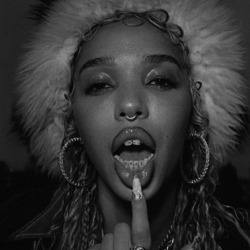

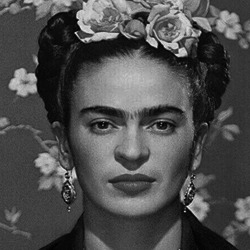

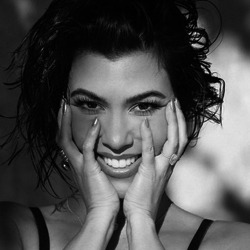
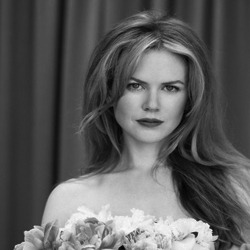
♇ enigmas i put above are fka twigs, krotchy, frida kahlo, greta garbo, kourtney kardashian and nicole kidman.
♇ understanding the enigma archetype, is that it shows that they are women who are usually deeply underestimated when it comes to their intelligence, spiritual women who are on a hermit path of understanding themselves and others.
♇ and to make the enigma archetype easier to comprehend i gathered characters from different tv shows or films that come under the archetype.
⟶ harry potter franchise - luna lovegood, embodies the shy and kept to themselves side of the enigmas, [as i said they are a very fluid and diverse archetype], as enigmas, luna is perceived to be someone who is strange but doesnt allow it to make her feel insecure. she helps other people and is kind, embraces her quirkiness.
⟶ from american horror story [coven] - misty day, the stereotypical spiritual enigma who cares for nature and the earth. has a special connection with animals and with life itself, very caring and eccentric, and as a healthy enigma, she doesnt allow people's views of her to bring her down.
⟶ avatar the way of water - kiri, when i was thinking of fictional characters who are the enigma, kiri was the first character that appeared in my head. she is connected with the earth, creative and connects herself to a higher source of power, [even though she is already connected to eywa from what i believe]. is connected to life and death.
⟶ from friends - phoebe buffay, embodies the childlike nature of the enigma, the nature where people perceive them to be "ditzy". when she is around the people she likes, she can come off as very chatty.
⟶ naruto franchise - hinata hyuga/uzumaki, embodies the shy nature of the enigma. the enigma that loves with their all, can have creative blockages and people underestimate who she is and her power. hinata is aware of how the world poorly treats people as she did belong to clan that didnt really care for their people. [ex. neji]. sometimes expresses the mysterious side an enigma can be.
⟶ from the original franchise - freya mikaelson, is the witch of her family and is very connected to nature, chiefly because of the time she was born. she is someone who likes to ground herself and is one of the siblings who thinks things out the most, will do anything for the sake of love and family. strong opinions and holds a strong bond of life and death, like misty day.
⟶ the last of us - dina woodward, likes to be connected to a higher source, shows when she gives ellie the evil eye bracelet, embodies the expressive side of the enigma and is likely open to "open-relationships" chiefly due to her bond with jesse and ellie. she is direct with what she wants, does like her peace.
⟶ from the haunting of hill house - nell crain, some people overlook her connection to a higher source of power; to see how you are going to die since you were young is pretty psychic. had spiritual phases and like many enigma characters is very connected with death, had tried to ground herself but wasnt able, especially becuase of her therapist. does keep a big part of herself but she normally did that because she didnt want to burden her siblings.
⟶ winx club - flora, represents the kind, nature-loving and mysterious side of the enigma, especially with the vibrant colours she wears, it might not really appear that there's this secrecy and mystery to flora's character but ever since i've watched the show when i was young, i've always noted an essence of puzzle and unsolved problem when it comes to her. like she's there but not at the same time.
⟶ from euphoria - cassie howard, you might wonder how cassie belongs to the enigma archetype and the girl embodies everything that an underdeveloped enigma is. is willing to drop everything for her lover, look past the red-flags and become what their lovers wants them to be. cassie is a big lover girl, and likes to make her lovers feel seen and heard, especially for what she did to nate, telling him she can be whatever he wants her to be.
♇ as i have done my research, i gathered that a lot of enigmas are are likely going to have capricorn, leo and pisces in their big three; in order of how much they appeared.
♇ they are also going to have leo, capricorn and taurus appear in their dominant signs; in order of how much they appeared.
♇ the planets jupiter, sun and pluto appeared in their dominant planets the most; in order of how much they appeared.
♇ the element that appeared the most was earth, second was fire and third was water.
♇ lastly, when it comes to the modality, what appeared the most was fixed and the second modality was mutable.

♇ feminine archetype masterlist
to find out what feminine archetype and sexual feminine archetype you are
buy a natal chart reading from me
masterlist
♇ pluto
#sabrina claudio#kali uchis#rosé#jhene aiko#fka twigs#the enigma#mystic archetype#the enigma archetype#enigma archetype#luna lovegood#misty day#harry potter#american horror story#kiri#phoebe buffay#hinata hyuga#dina tlou#dina woodward#freya mikaelson#nell crain#flora winx#cassie howard#euphoria#capricorn#leo#pisces#taurus#jupiter#sun#pluto
475 notes
·
View notes
Text
Wellness Series : If you want to get prettier, get HEALTHIER.
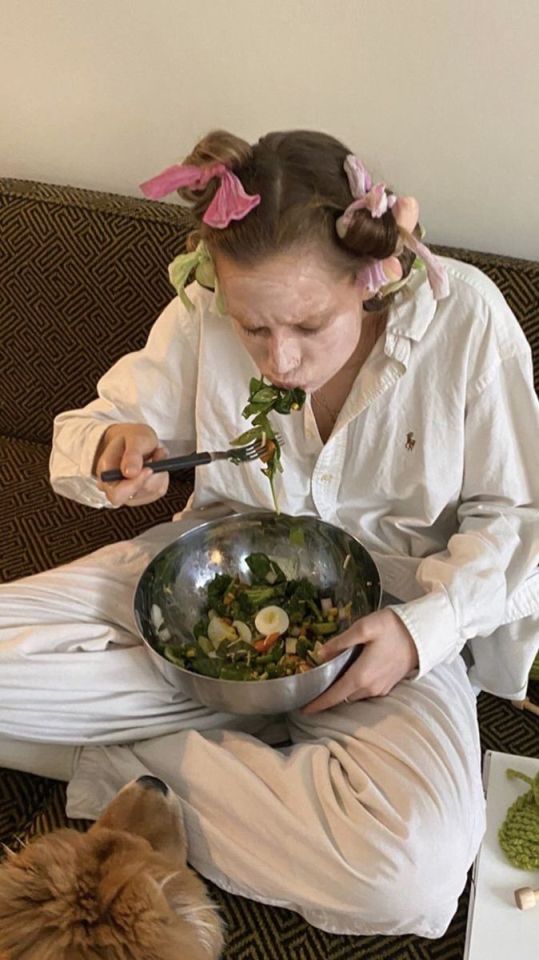
Holistic health is an approach to health and wellness that addresses the mind, body & soul. One of its core beliefs is that physical, mental, emotional and spiritual well-being all contribute to the overall health of an individual.
Therefore, it seeks to improve the WHOLE system rather than just the physical aspect.
Over the past year, I observed that as my health improved, so did my looks. I noticed I began to have a youthful glow, lost weight, toned up & achieved an overall vibrant look.
It's a beautiful journey & I am still learning everyday.
Whether you're new to this space or not, here are two holistic approaches to wellness to get healthy & sexy at the same time. Enjoy x
Juicing/Smoothies.


This is a beginner friendly approach to living a healthier life. One struggle most people face is adjusting to the taste and texture of greens. Juicing is a great way to get your nutrients in without all the hassle.
Tips
Slowly is the fastest way- You can start 2-3 times a week & go from there. This gives your body grace to adjust to the extra fibre.
Do your research: Books, podcasts, blogs, Interviews can all be accessed easily. Learn recipes that fit your particular needs.
Be consistent & patient: Don't just try it for a week and give up. It takes time and effort.(compound effect)
Releasing Stuck Emotions In The Body.

This is another powerful way to get healthier (prettier).
When we experience trauma as children & we are unable to process our emotions, we tend to internalise it and think there must be something wrong with us. As this continues, we begin to store negative emotions within our body.
Stuck emotions can manifest in numerous ways like : poor posture, low self esteem, anxiety, depression, poor self concept and even health conditions. As you begin releasing stuck emotions you start to look younger, vibrant, healthier and glowy.
Ways to release emotions in the body
Daily Movement
Therapy/ Coaching
Meditation
Inner child healing
Journaling
Yoga
Cord cutting rituals
Forgiveness of self and others.
Tips for beginners: Do not try to make huge changes all at once but rather small changes everyday.
Share this with your wellness bestie today !
xoxo, Vivacious
#divine feminine#healer#Wellness#holisticwellness#holistichealth#inner work#self development#self love#level up#glow up#feminine journey#women empowerment#innerunion#masculine feminine#spiritual blog
133 notes
·
View notes
Text
DFF, Found Footage, Technology, and the Real
Okay so I've been slowly looking into horror and technology since watching Shadow, and now DFF has me going down a related research spiral. So let's call this a sibling post to my Shadow technology series (which I am slowly working on I promise).
I just thumbed through a great book on found footage horror and a few other pieces on technology and wanted to use these as a lens to think about DFF and how it's navigating a number of themes including the distinction between reality and fiction.

DFF draws on the concept of found footage films like The Blair Witch Project. Even if DFF's main framing and style isn't found footage, the film the characters are working on is. And we get our most direct reference to a horror film when Jin references The Blair Witch Project--an iconic found footage film. So I want to start by thinking about the Blair Witch Project.
Part 1: The Blair Witch Project and DFF
Part 2: Paranormal Activity, DFF, and the Myth of the Real
Part 3: Films within Films, Surveillance Technology, and Other Connections (Man Bites Dog, Cabin in the Woods, Shutter)
Part 1: The Blair Witch Project and DFF

While found footage horror doesn't purely originate with the Blair Witch Project it certainly rocketed the concept into the popular zeitgeist. I watched the film for the first time this week, and while it didn't scare me*, I could easily see how influential it would've been at the time. The media landscape looked very different in the late 90s, and the film's marketing deliberately played up the idea that this was real footage in a way that simply couldn't be done today with our current media landscape and familiarity with the found footage genre. We're now much more familiar with fakelore as a concept in general.
*The scariest part of watching was the censored subtitles! Stop that please! They seriously were replacing things like "Oh, fuck" with "Oh, boy." I also got a car add about going out to enjoy national parks, and how they can be accessible to Deaf people, which was an interesting moment of double irony.
In her book Found Footage Horror Films: Fear and the Appearance of Reality, which I will be citing quite a bit in this post, Alexandra Heller-Nicholas notes that the Blair Witch Project came out at a time when amateur films were still relegated to home videos but entering public viewing through shows like America's Funniest Home Videos. The style was thus associated much more closely with trying to capture reality than tell a fictional story. The marketing played into this heavily--for example: using the actors' names for the characters, circulating missing persons flyers in areas where the film was being shown, and creating a website that gave background on the Blair Witch myth and information on the "missing" trio of amateur filmmakers. I chatted a bit with @slayerkitty who saw it in theaters. She explained how part of what made the film scary at the time was how real so many people thought it was and the tension of being in the audience.
TBWP and DFF Similarities
Let's start by going over some of the ways DFF might be directly pulling from the film or making homages before jumping into what I think are probably the more significant thematic connections with found footage.
Myths and an Ambiguous Antagonist:

The Blair Witch Project is set against the backdrop of a local myth about a witch in the woods. Three young adults (Heather, Josh, and Mike) go to make an amateur documentary about the witch, get lost in the woods, and are then hunted by an unseen presence. We get information about the myth through interviews with locals and a book Heather reads aloud briefly called The Blair Witch Cult. We learn about the slaughter of 5 men (which is described almost like a ritual), disappearances and deaths, and a man who was compelled by the witch to slaughter children. Similarly in DFF we have our Janta cult, which slaughters people in the name of a supernatural or spiritual force. Now I'd say this could be a nod to TBWP but it also draws on plenty of other ghosts stories and urban legends about the woods. I'm sure there are also particularly Thai valences as well beyond just being Buddhist on the surface.
Like the trio in The Blair Witch Project, the group in DFF goes into the woods to film--though they aren't traipsing through the woods, and the horror they're filming is a story of their own creation. In the present, however, the horror becomes much more than fiction, just like in TBWP. In the film, we see and hear signs that something or someone is following the trio but it's ultimately unclear if it's supernatural, locals scaring them, or them slowly cracking and turning on one another. In DFF's opening episodes it's likewise unclear if what's happening is being caused by a person, hallucinogens, or something supernatural.
Maps and Marketing:

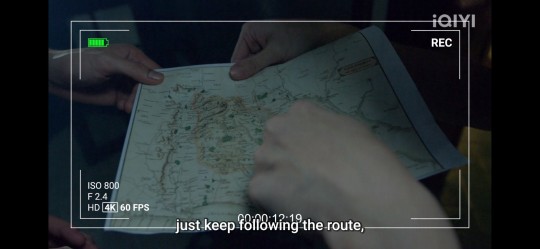
TBWP also shows the characters turning on one another, arguing, and cracking in a way that fundamentally sabotages their survival. At one point, Mike reveals that he threw their map, their only lifeline, into the river. This is paralleled in Fluke turning away their transport and means of leaving. The map is an important focus in the film. We see Heather orienting the group and insisting she knows where they're at, while Mike insists they're lost. This culminates in them losing the map as things start getting worse. DFF slips in what I read as a potentially more direct reference to the film in episode 8. An odd new detail in the group's film where they rely on the hope of a map to get out before they're attacked by the masked killer again.
Another potential similarity to draw on has more to do with the outside marketing of TBWP. Interestingly it was marketed to appear like an indie film despite having pretty extensive funding. This makes me think of the group's film in DFF. This is meant to be a student film but they received a huge boost via Por's dad giving them extra money for a camera.
Smoking and Being Alive:

One other parallel I find interesting is the emphasis on smoking. To be fair TBWP is probably not the first or last horror film to have people smoke (the pot head is a character trope of it's own), and I was likely primed to notice because we already had "Tan smokes and has asthma" on our list of clues for DFF. Now clearly the writers of DFF are smart and are using Tan/New smoking in plot relevant ways. These details feel purposeful to the story they're crafting. But let's briefly look at how smoking shows up in TBWP.
The characters all smoke and drink alcohol. As they get lost and the days tick away they run out of food and smokes. Josh has moments that could be attributed to withdrawal where he laments that they're out of cigarettes. However, after he disappears, Mike finds some remaining cigarettes at the bottom of one of their bags. Mike comments "We're still alive cause we're smoking." For him, it signals even if briefly that they are still alive, that they're surviving.

But in DFF, smoke seems to be attached to death and dissociation. We know that New is a smoker, something he perhaps picked up in England. It starts then as a sign that he has a life, one outside of being Tan. Yet it's that very life, being abroad, that led him to be so far from Non when he disappeared. For New, his life is now tinged with guilt and loss. As @syrena-del-mar noted here, there are moments where he forgets he is supposed to be New. But the smoking becomes his one reminder that "New" is still alive.
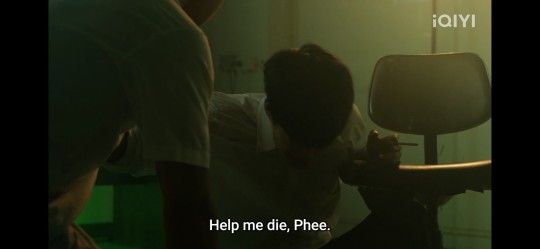
Yet this reminder turns more and more painful. Under the exterior of Tan, he is haunted by New, the brother who didn't make it in time. And this spirals further when his mother and father die. Each time he's a step closer but still too distant to stop their deaths. At this point, he starts getting high to a dangerous degree--dissociating, hallucinating, torturing himself with visions of Non. When Phi steps in we have a parallel moment to Phi stopping Non from taking pills. Smoking turns from a sign of life to one of death as New tries to commit suicide, telling Phi "I don't want to live anymore." And New takes this further when he drugs the rest of the boys. Perhaps he didn't intend it to go so far, but he certainly is happy with the result. His drugs, his smoke have caused fear and death, rather than hope and life.
Except for the map I feel like most of these parallels can as easily be chocked up to direct inspiration as they can be attributed to both pulling on a similar well of genre conventions. What I find more interesting is the thematic conversation TBWP brings to the table for DFF.
TBWP and Thematic Resonances with DFF
Filtered Reality:
In her work on horror, Brigid Cherry remarks that The Blair Witch Project is "about the way in which technology gets in the way of seeing" (qtd in Heller-Nicholas 23). Heller-Nicholas further notes how the camera is constantly in contention with the audience's desire to look at what we want to see. In the film itself, one of the characters even remarks that looking at the world through the camera is "like a filtered reality" because you "can pretend everything isn't exactly like it is."

This looking but not seeing resonates to me with Jin. He looks at Non through the camera, seeing him as innocent, in need of protecting. But there's so much he doesn't see about Non, including the reality of poverty. Jin's perfect view of Non breaks at the moment he sees Non with Keng. But as Jin's filtered vision of Non cracks, he adds a new filter. He frames Non as a slut, someone guilty in his mind, at least in the he heat of the moment. So he records him. In doing so, he papers over the nuances of the situation, that it is SA and that there is so much of Non's life that is outside of Jin's lens.
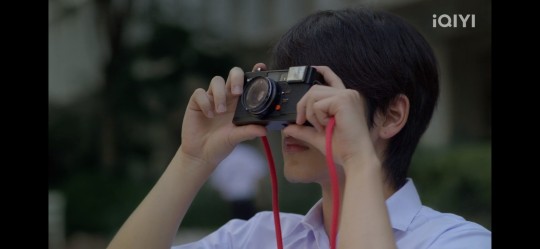
After Non's disappearance Jin doesn't stop using his camera lens to view the world. In episode 9, he watches the others play soccer and then Phi through his camera. He is pretending nothing happened just like the rest of the group, but for him to do that he has to filter his reality. And just like with Non, Jin isn't able to see the full story around Phi from this small frame of a perspective.

I also think it's worth noting how the show, especially in the flashbacks tends to use strong framing (I note some of this in episode 5 but it persists strongly at least up until episode 9). While they aren't using a found footage style, there's still a sense at times that the camera is limiting our view as it closes in around the characters. It's as if the camera frame becomes hyper-visible, similar but not exactly like in found footage. I'm not entirely sure how to read this just yet, but it feels appropriate for both a mystery and for a story so deeply invested in perceptions. There's a strong focus on what is made visible and what is rendered invisible by the characters, by the story structure, and by the frame of the camera itself.
Gender, Space, Control:
In her discussion of TBWP, Heller-Nicholas discusses the gendered dynamics of the film and how scholars have read the film as invested in the horror of female control. This is captured in two ways. First in the way the woods as a space become imbued with the horror of the Blair Witch (pulling on a tradition of witches being women), and thus the feminine. Second, in the way that Heather, who is the director of their film, leads the group to folly. Scholar Linda C. Badley, has argued that "Heather represents a serious breach in having taken possession of the conventionally male--and often murderous--gaze" (qtd. in Heller-Nicholas 108). Heather thus enters the domain of the typically masculine and the results are disastrous.
I find it interesting to compare DFF with TBWP in this respect because they've taken a genre that often is infused with binary gender dynamics and given us all men, and predominantly queer men. This is obviously a dynamic of BL, but it's interesting to consider how this plays with the themes of gender that often proliferate in horror. This is a much broader topic, and @brifrischu and I are currently reading through Carol Clover's seminal work Men, Women, and Chainsaws so I wager we'll have more to add to the discussion at some point.
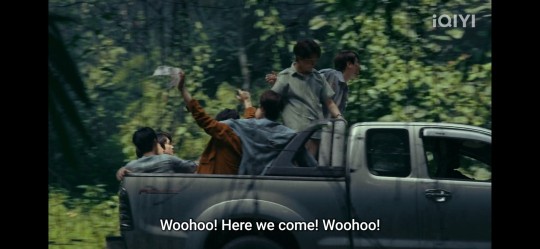
But let's look at a few things. First, if the Blair Witch imbues the woods as a space of feminine horror, DFF paints the woods as masculine. After our cold open, we are introduced to the group as they ride into the forest via Por's narration about the legend of Janta. The subtitles at the very least, refer to Janta using masculine pronouns. I don't want to assume that Thai gender coding and dynamics are identical to western ones but we might consider the way that the group of boys, packed into the back of a truck paint this as a masculine, homosocial space.
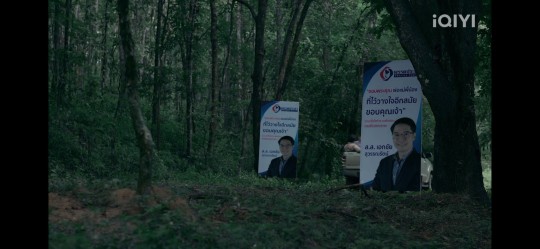
This is reinforced by the mention of Por's father. Por says "My dad warned me that, so I had to listen to him." This masculine authority is doubly highlighted by the campaign posters that literally mark his control of the space. To go any further the group must pass through these signs as a threshold to the space. Here we have not just masculinity being signaled but wealth, power, and control--something that contrasts distinctly with Non, for example, who has none of this. And of course, as we move through the story much of the horror comes from the actions of the core group of boys rather than the masked person we started with.
I find it interesting too that as Por tells the tale, it's White who comments "You almost had me scared." They then have a discussion about Tee liking to teaser "the younger ones." This focus on White as the most vulnerable is interesting given that he reads as perhaps the least traditionally masculine of the group*.
*Another reason why I'm excited to read Clover's work, is because she came up with the final girl formula in her discussion of gender in horror. I'd love to think about how we apply that in a queer context, especially given how so many of us have collectively felt White will be final girl. What might DFF be doing re: gender within the context of queerness, and what might it be asking of us as an audience?

The second aspect of this is the directorial gaze. In TBWP we have a woman taking on the control of a film project. This is important not just because Heather takes on a typically male profession but also because of the way films are imbued with what Laura Mulvey has termed "the male gaze." The view from which we see the world and the terms on which stories are told are traditionally male, while women are objects to be looked at--something Heather bucks and is punished for.
In DFF we have a similar struggle over authorship and directorial control. Instead of a strict division between feminine and masculine gazes, we get a struggle that is imbued with distinctions of class first and foremost. Por stands in as the more traditionally masculine director. We see the violence he does in trying to maintain control of the project. Of course he mostly does this through exerting his wealth. In contrast, Non doesn't fit the more aggressive masculine role, he comes from poverty, has mental illness, and is generally at the bottom of the social pyramid. His authorship comes into tension with Por's desires for directorial and social control.
There's a strong thematic exploration here of not just who gets to tell the story, but who's story gets to be told. In the end, the camera is Por's, his wealth and framing win out, and Non's authorship is buried. Much like the male gaze relegates women to objects rather than directors or authors, the only film that Non gets credit for is the sex tape in which he becomes objectified by the camera.
Of course we then have the fact that, in the present, Non's revenge script is being played out. There's a new director here, and clearly it's not entirely Phi (who tries his hand at directing in episode 1). Regardless of who is orchestrating these moves, we have an inversion of power happening. While we can't say for sure until the show has wrapped up, I suspect that DFF will lean into this inversion, rather than, like in TBWP, punishing this transgression of the norm.
That's all for now on TBWP, but certainly not all on DFF. I'm going to turn now to another important found footage film, Paranormal Activity, to unpack a bit more about DFF and it's themes.
Part 2: Paranormal Activity, DFF, and the Myth of the Real
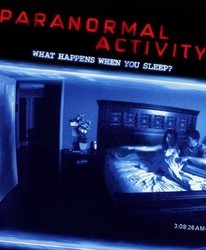
In her work Heller-Nicholas notes how, after Paranormal Activity hit the screen, our view of found footage as a genre shifted. It was no longer seen as necessarily authentic per-se but a stylistic form. Heller-Nicholas puts it like this:
As these more popular found footage horror films made their way to the forefront of the genre, what became important was not that the audience necessarily believed that they were real, but rather that they offered a framework to knowingly indulge in a horror fantasy of the real. The solidification of a recognizable found footage horror style meant that horror audiences understood and identified them as such, defining a subgenre where an authentic style (rather than claims of authenticity itself) prevailed
(Heller-Nichols, 128)
I won't go into smaller parallels between the film and DFF (partially because I haven't seen it, so if you have please add anything you notice), but I want to cover a few thematic resonances.
Heller-Nichols sketches out a few ways that critics have interpreted the film. First, as an allegory for materialism in the context of the US housing market crash of the time. Second, as a reflection on surveillance and the way changes in technology changed our relationship to cinema.
The first theme, materialism and consumption play out in the film through both the financial disparities of the characters and the more metaphorical spiritual/demonic possession that takes place. Both DFF (at least episodes 1-4) and Paranormal Activity take place in a luxurious house and themes of greed and materialism are present. In DFF, Por takes this role, flaunting his wealth and using it to get what he wants. Of all the characters, he is the one most willing to steal credit from Non. In Paranormal Activity the wealthy boyfriend even brags about buying a nice camera on only half-a-day's pay. Similarly Por brags about getting the nice camera for their film with his father's money.

One thing that set Paranormal Activity apart from earlier found footage films like The Blair Witch Project, was it's use of security camera footage. It relied on a new type of gaze that made the private public in the context of shifting surveillance technologies. While DFF largely centers itself around a film camera, it also includes other forms of technology in the background, including surveillance cameras. The CCTV cameras in Por's house come to mind as a significant way this technology comes into play. On the one hand, it helps Por identify that there is an intruder, and it helps the group find him when he is hurt. On the other hand, it encroaches on the private, capturing White and Tee having sex. This private vs public line is of course horrifically crossed when Jin records Non and Keng and when this video is circulated--surveillance right in our hands via cell phone.

Heller-Nicholas notes that post-Blair Witch, and by the time Paranormal Activity was released, audiences were much more genre savvy. She notes that the genre's "pleasures are not reliant on our gullibility, but rather our willingness to succumb to the myth of the real that these films offer..." (26). Relevant to DFF, I want to stress the "willingness to succumb to the myth of the real." I discussed earlier how Jin doesn't see Non; instead, he is happy to succumb to a myth of what could be the real Non.
But it's not just Jin who does this. Almost everyone around Non believes they see him correctly--as "Greasy", as a bad son, as a cheater, etc. This takes on even more public dimensions as the police enter the picture, as the sex tape circulates, and as the police report that he has run away with Keng. What people see and believe about Non, the narratives they tell about him, help reinforce people's existing understandings of the world--their prejudices, their assumptions, their myths of how the real world works.

And of course, film is at the center of this. The police believe that Non wasn't with the group when he disappeared because any footage he was in was hidden from them. Non is erased from the film (both in the footage and in terms of credit). The entire film premier is one big moment where everyone in the group is playing into this myth. It is taken as fact that Por's name being in the credits means this is his work--that nothing or no one of note was hidden behind the frame.
In her work Heller-Nicholas points to discovered manuscript fiction (such as Dracula) as a precursor to found footage horror. This connection highlights the way these works rely on the fiction that someone has organized the documents apart from the original author. The fictional framing of found footage as pretending to have an original author or filmmaker other than the actual director, hides the fact that The Hidden Character has in many ways literally stolen credit from Non. The genre expectations obfuscate the real story.
And then there's the sex recording (the only film Non gets credit for). We see a number of reactions to the recording from people in Non's life as well as those outside of it. The social media posts in particular stress the way Non's vulnerability is quickly slotted into pre-held narratives of sex and sexuality that refuse to see the reality of SA.
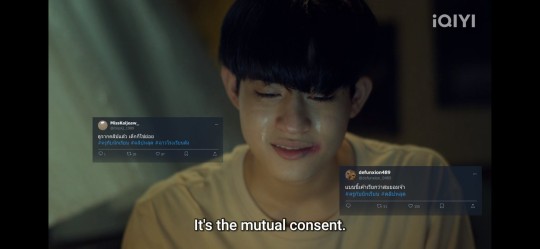
Non's SA is taken as truthful evidence of his consent via social media, while the film the group made is found footage but not seen as real. I think this marks an interesting change in the aesthetics and narratives we find "real." Horror and found footage are legible, a chance to engage in "a fantasy of the real". Meanwhile, the real story behind the film is erased, just like Non. Sadly, the most legible narrative of a young queer boy is that the phone footage is slutty or even hot. No one questions the authenticity of the recording, it is viewed as real. Ironically, compared to the horror film the group shoots, the sex tape is the real found footage film. Yet the "reality" it shows is filtered through interpretation. Non's reality gets buried.
Meanwhile, as an audience, we have the opposite reaction. We are slowly given insight into the discrepancy between Non's reality and the myths people hold. We keep asking why other characters can't or won't see the truth, why they won't help Non until it's too late.
DFF may not be found footage itself, but it is certainly interested in exploring and extending the thematic conversations about authenticity, reality, and narrative.
Part 3: Films within Films, Surveillance Technology, and Other Connections
Despite the fact that DFF references and dialogues with the found footage horror genre, it formally has more in common with films that center around technology and films within films. So I wanted to cover three more films that I think dialogue in interesting ways.
Man Bites Dog:
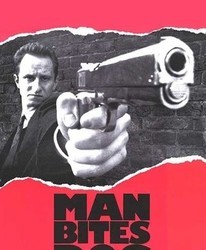
I'll start with Man Bites Dog since I have the least to say about it. It is a 1992 French mockumentary and black comedy, that Heller-Nicholas notes is a pretty significant and well-acknowledged precursor to the found footage horror genre. I'm not sure I want to get to deep into themes with this one. But I thought the parallels were interesting. A film crew decides to make a documentary where they follow a serial killer named Ben around only to be pulled into the crimes and become culpable themselves. That is, until Ben is killed and the film crew are taken out one by one by an unknown killer. We have a film crew that slowly gets involved and more culpable in wrong doings, just like in DFF we have the group working on a film while slowly becoming more and more culpable in harming Non. Meanwhile in the present both "film crews" are suddenly being hunted and picked off by an unknown party.
Cabin in the Woods:

Cabin in the Woods is a 2011 film that satirizes horror. A group of college students go to a cabin in the woods and are slowly picked off. The twist is that this is all orchestrated by an organization that is simultaneously surveilling and orchestrating their deaths to appease ancient deities. Many of the shots are done through drone's and other similar visuals to highlight the way the group is being surveilled. In a chapter from a collection on horror and gender, Hannah Bonner looks at Cabin in the Woods and a few other films that include surveillance and social media. She discusses the way technology in these films revolve around slut shaming young women. As she puts it, "It is the 'fact of being constantly seen', whether by high key government surveillance systems or by judgemental peers, that throws these characters into disarray or death" (89).

For Cabin in the Woods one thing Bonner examines is the way the film frames the group's "slut" character Jules. Jules and one of the guys go outside to get intimate. And the film moves between this scene and the men surveilling them who watch eagerly. Bonner reads this as a commentary on the violent gaze with which horror frames women. She makes a distinction, noting that "The voyeur is no longer just the audience, squirming in their seats from Michael Meyers's point of view as he tracks down his naked sister and her boyfriend in Halloween...now the audience as voyeur watches the voyeurs watch the surveyed" (90).
DFF makes a similar move by staging multiple instances of filming (a film within a film, or in this case a film within a show). We get a moment in episode 1 where Tee steps forward to block the group watching the CCTV footage of him and White. But this denial is in contrast to other moments. The show draws us most into being voyeurs watching voyeurs, when Jin films Non. I think it's important to note that both the moment that Bonner discusses in her chapter and this moment in DFF are sexual. In CITW, Jules is literally labeled by her surveillers as "the slut", a role she must fulfill and be killed for to appease the gods. Her lack of agency is made quite apparent. In DFF, Non is also slotted into the role of the slut by those around him, including Jin when he films the moment out of anger. While the show is not as on the nose about the whole thing, it's still clearly establishing a discrepancy between how Non is viewed by those around him due to the tape and the lack of full agency he possesses.

Moreover, by making us viewers voyeurs of this voyeurism, DFF creates a critique rather than simply a simulation of voyeurism. I am considering how this might not just be a commentary on sex shaming, but sexuality within a space where BL has historically crossed the line at times in terms of depicting SA. Or even the way that BL actors in Thailand are often expected to blur the line between the private and the public through fan service. It's interesting because clearly the show also doesn't shy away from letting us be voyeurs to sex. The show perhaps draws a distinction between representing queer sex and SA. But it's fascinating how this is mediated through voyeurism and the camera's gaze.
Shutter:
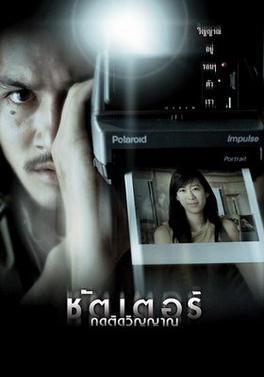
I couldn't wrap this post up without talking a bit about Shutter. Shutter is a 2004 Thai horror film (and probably Thailand's most well known horror film globally). It was part of the horror boom of the late 90s and early aughts in Thailand and Asia. If you throw Thai horror and cameras my way, I will think of Shutter. I watched it as part of some research I've been slowly doing on late 90s/early 2000s Asian horror and technology (writing meta for Shadow the series). It's a story about haunting that takes inspiration from the idea of spirit photography.

The film follows a couple, Jane and Tun, both photographers, who start seeing shadows and faces in their photos. Jane discovers that the ghost is a girl named Natre who Tun used to date in secret. They proceed by trying to figure out how Natre died (suicide) and how to get her to move on. Meanwhile Tun's friends suddenly start killing themselves. Ultimately Jane learns that Tun's friends raped Natre, and Tun not only didn't stop them but even photographed the assault at his friends' request (so Natre wouldn't snitch). Jane confronts Tun who expresses his regret, that he "never forgave [himself]." In the climax of the film Tun uses a polaroid camera to try and find Natre's ghost in real time before being driven out the window. Natre let's him live, in a near catatonic state, unlike his other friends because his betrayal hurt the most.
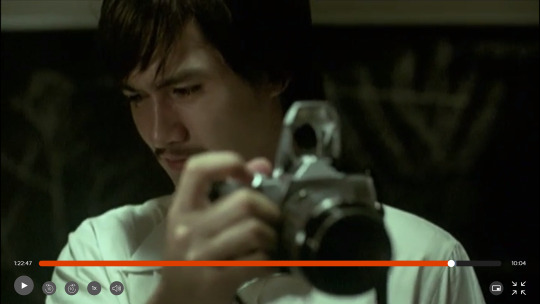
We once again come back to themes of voyeurism, SA, peer pressure, and culpability. The film has strong focus on the effects and betrayal of being a bystander, much like DFF does. Again this parallel is made quite strongly with Jin. Non may not have had feelings for him, but he is the kindest of the group, making his betrayal hit strongly. Jin filming Non and Keng has it's own nuances within DFF, but it certainly parallels Tun photographing Natre's assault. Similar to Non, Natre disappears in the aftermath, while Tun and his friends go on with their lives.

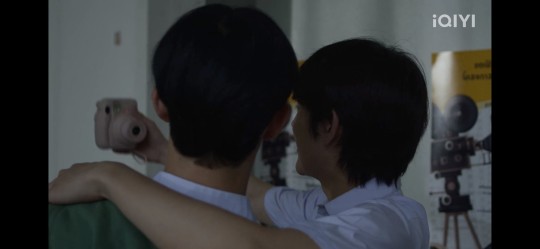
On a smaller note, both Tun and Jin use polaroids in what is potentially a reference to the film.
As the truth is revealed, Tun goes from a protagonist to a villain, and Natre goes from the horror of the story to the victim. DFF seems equally interested in the idea of how truths get hidden and justice withheld. It also gives us an inversion of the source of horror. By the time we end episode 5, the group we've gotten to know over four episodes are clearly villains in our minds, their cruelty becomes the horror rather than the masked killer who we come to empathize with (or at least root for to some degree). Now how this fully plays out in the end might shift things. But currently (up through episode 9) this is a horror story locating horror in power and cruelty rather than simply reinforcing a more conservative world view of the non-normative monster.
Concluding Thoughts
Dead Friend Forever is mixing genres in a smart and deft way. It's clear that the writers and director are well versed in horror and are ready to play with genre conventions to deliver their ideas and themes. Some of the connections I'm making here might be happy coincidence where the works speak to each other mediated by my own perspectives and interpretation. But I also believe that the show is building on themes and traditions in horror and found footage horror specifically in smart ways. From the framing of shots, to the way they deftly speak to themes of (in)visibility, power, reality vs fiction, agency, and sexuality (among others).
Through all this, DFF has been incredibly genre savvy. While found footage plays on the idea of reality, DFF shakes that up by throwing a who-done-it mystery our way. Like in The Blair Witch Project, for much of the show, we don't know what's real or what's in the characters' heads. DFF, however, picks up where TBWP stops. At the end of TBWP, the characters are likely killed off camera, the source of the horror still left up in the air. DFF gives us this ambiguity, but then pivots and makes the show a mystery to solve rather than locating the horror in ambiguity. This is because the horror lies elsewhere. Like in Shutter, the monster becomes the victim, our sympathies are played with, and we're left with a show that is as interested in social and political critique as it is in having fun playing with horror tropes.
Sources:
Heller-Nicholas, Alexandra. Found Footage Horror Films: Fear and the Appearance of Reality. McFarland & Company, 2014.
Badley, Linda. Film, Horror, and the Body Fantastic: Praeger, 1995.
Bonner, Hannah. “#Selfveillance: Horror’s Slut Shaming through Social Media, Sur- and Selfveillance.” Gender and Contemporary Horror in Film, edited by Samantha Holland et al., Emerald Publishing, 2019, pp. 85–99.
Cherry, Brigid. Horror. Routledge, 2009.
Shutter (film, 2004)
Cabin in the Woods (film, 2011)
Man Bites Dog (film, 1992)
The Blair Witch Project (film, 1999)
Paranormal Activity (film, 2007)
#i think next i want to write a piece on Tan/New and the way the show is drawing on the mad scientist sub-genre#dead friend forever#dff the series#dff meta#my posts#my meta#dead friend forever meta
79 notes
·
View notes
Text
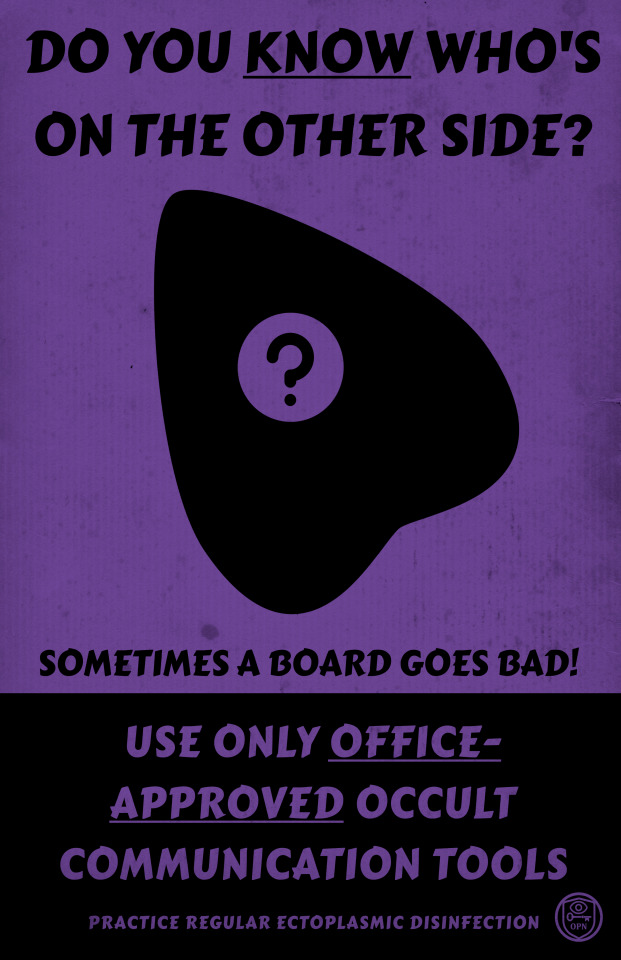
[It is January of 2022. I’m entering a wing of the DC Office site that looks older than the others. The carpets are a strange brown, vintage looking, and the lighting casts an almost yellow pallor over the wood paneled walls. I can practically smell the cigarettes. I pass by an empty room labeled “social media office” - boxes piled up by the door. Maybe they’re going to be using it soon. They’ll need it.
I approach a door labeled Necrocommunications, knock lightly twice, then enter.
I am greeted with the sound of a voice drifting softly across the room. A few chairs and tables sit around me, the same vintage style as the hallway before, the same browns and yellows. A high desk is across the room, and a woman is seated at a control panel. She has black curly hair, done up in an old fashioned style, a polka dotted blouse, and though she’s facing away from me, I can see the edges of cats-eye glasses.
The panel she’s working at is huge, and resembles the type of switchboards they used to use in the ‘50s, dozens of physical wire connections crisscrossing the device and attaching via plugs. The woman has a headset, one ear covered in a bulky speaker, with a microphone near her mouth. She speaks casually, with an incredibly heavy New Jersey accent.]
I] Oh, him? He’s circled, babe. Taken as hell. Mhmm. And he still asked you? Ain't that a bite. So now you know he’s out of the question and yarding on. Dodged a bullet, hun.
M] Irene?
I] Oh, god, hold on. My appointment is here. Yeah. I’ll call you later, beautiful. Caio.
[She hung up the call, taking her headset off and turning to me. She looked like she was straight out of my grandfather’s high school photo album, including the color. Her skin was almost grey, it was so pale, but she didn’t seem like she was sick. She looked me over with a smirk and a raised eyebrow, leaning forward on her desk.]
I] Well, hello Miss Meghan Hendricks. What can I do for you, sugar?
M] I’m here to interview you for my audit, Ms Donofrio.
I] All business, aincha?
M] This is my job.
I] ….yeah, you’re right. Sorry. I don’t get cute visitors much.
M] Right.
I] Pull up a chair, hun.
M] I’ll just stand. This won’t be long. I came here because of your Occult Communication Tools poster.
[She sits back with a dramatic sigh.]
I] Yeah, took me forever to convince them to let me do that. We had agents using spirit boards, pendulums, casting runes, tarot cards, ghost boxes, all kinds of shit they brought from home. Bought from Walmart, or worse, a thrift store. I was always telling them, honey, baby, you gotta use our stuff, we maintain it, we disinfect it of ectoplasmic residue, lockout-tagout procedures, the works. It’s so, so unsafe to use anything but our tools. Sure, you gotta do paperwork when you check it out, but it’s better than somethin’ following you home…
M] Right into it, I guess. That’s what Necrocommunications does, right? Talk to the dead?
I] You bet, sugar. The dead, demons, angels sometimes when they ain’t on our plane or in realspace. Other little spiritual twerps and bugaboos.
M] I’ve been asking this a lot in the last few months, but…you can do that? Consistently?
I] Consistent enough to make it worthwhile. S’not perfect. Fails most of the time, depending on who you’re calling.
M] How so?
I] Well, some people don’t wanna be called. Some people are chatterboxes. We got a list of likely contacts who we suggest people contact, but…we do other people sometimes, too. Always worth a shot, I say.
M] How does it work?
[At that, Irene winced slightly and wagged her head from side to side.]
I] We got theories, but more importantly we got procedures. We know different things work for different people. Sometimes it’s cultural. The method that contacts Mr Smith may not work for Mr Chan, y’know?
M] It’s mostly for information gathering, then. Like the Board of Infernal Affairs.
I] Information gathering’s a big part of it. Someone died with a secret? See if they got loose lips now. Also, y’know, helps with hauntings or gettin’ rid of little jerk spirits.
M] You mentioned disinfection….
I] Yeah, yeah, there’s….risks, y’know. Sometimes the person you contact ain’t a fink, you know, and they start a whole new haunting. Sometimes one spirit’ll lie and say they’re another. Then they follow you home, start leeching your energy. Happens less when we cleanse the tools. Which is why there’s procedures for this, and every Office staff member in the building is trained on at least the basics.
M] Is it….is it only for Office personnel? Is it something I could…
[Irene’s face grows into a playful smirk as she hears the hesitation in my voice, leaning her face in her hand.]
I] You got fifty cents?
[She leads me into a back area of the office. Lining the walls in storage containers are row upon row of spirit boards, each box with a paper listing the dates each was used and then cleaned, along with the name of the person who did it. There are other items, too - pendulums, bags of runes, spirit boxes like you see on ghost hunting shows, and other devices and artifacts I don’t recognize. Irene’s attention, however, is on a phone booth at the end of the room. It’s clean but battered, clearly old and used. It has no door, but an open front, and above the phone itself is a depiction of a figure on a boat, with one word beside it: “Charon.”]
I] We confiscated these in the 80’s. It’s easier to use this one than have to sign out spirit board, y’know.
M] Weren’t you just complaining about that?
I] I complain about a lot of things, sugar.
[I approach, standing before the phone in disbelief. Irene senses my hesitation.]
I] Put in the money, then use the keypad to type out the person’s name. It’ll take it from there. Who you gonna call? Grandma? Mom?
M] My brother.
I] Ah. Shit, honey.
M] He died in California. Two summers ago.
[As I reach for the receiver, I see Irene’s face freeze in some sort of concern.]
I] H-honey, that…was he in—
M] Yes.
[I put my hand on the receiver, and I feel her hand on mine. She’s cold. She’s so cold and clammy that I jump slightly and look her in the eyes. Her face is sorrowful and scared, searching me.]
I] Honey…you won’t be able to—
M] You said—
I] If he was in…there’s no one there, sugar. He’s gone.
M] I know he’s gone, but you said I could—
I] No, no, he’s…if he was…he’s gone, gone. There’s nothing left of him. You can pump quarters into that thing all night long and you won’t get anyone.
M] H…how? I was…I was on the phone with him when it—
[As I watch, her eyes go wide, and she covers her mouth.]
I] Th-that’s how you remember, isn’t it? Thought you were just…in the Office but you hadn’t known about…that’s how you remember.
[I let go of the receiver. I can’t feel my fingers. I’m shivering, but not from the cold.]
M] I know how I remember. What I want to know is why everyone else forgot.
#office for the preservation of normalcy#interview#necrocommications#necromancy#microfiction#sci fi#horror#writers on tumblr
146 notes
·
View notes
Note
Lewis gave an interview in 2020 with a Chilean publication, “El Mercurio” where he was directly asked about his faith. He’s not Christian anymore, definitely more of a deist or a “believer in energy” as he put it.
Interviewer: Senna was very religious, are you as well? What do you believe in?
Lewis: I was raised Catholic. I used to go to church every weekend with my family until I started racing, then I started to do it less frequently. I studied in a Catholic school as well. I'd say I was very close to God during my twenties. I've experienced some divine illumination sensations and I start to ask myself some things. For example, I ask myself why I am the only black driver here, why me? Or after a qualifying lap, I question myself where does the strength to achieve that come from, how did I do that? I really do think there's a force bigger than us somewhere in the universe, not sure though if anyone will ever actually know. I feel more spiritual than before, I'm reading a lot on what happens to the planets. I'm extremely curious about space, one of my favorite things: watching the stars, study the gravity...I'd say I'm more of a man of energy. I believe in the energy given by the fans and I try to use it.”
thank you for sharing, i didn’t know he’d been asked about this as recently as 2020!
this makes me want to talk to him about it all so badly
#‘study gravity’ sksksk how can one person be this interested in so many things i’m in awe of him#lewis hamilton#ask
155 notes
·
View notes
Text
While listening to the new podcast that Jacob Anderson was on I seriously got emotional about it. And it was not because of what he said about letting Louis go for a little while.
It was because when Jacob as talking about the other roles that he has had and how usually when he ends a role he doesn’t ever want to celebrate them but with Louis and Interview with the Vampire he decided to do something different. When he took the rocks from the Dubai set and scattered them where he felt most comfortable really felt like for once he was celebrating the work of the past two seasons.
And on top of that it really expressed to me how special IWTV as a show and story is. I know a lot of people have their favorite shows that they obsess over but this show really is something else. Like even Jacob says he is not really a spiritual person and neither am I but this show is so extraordinary that it just feels not of this world. And I don’t mean to sound so sappy or cheesy about this. I mean think about it there have been so many hurdles that this show has had to go through throughout the production of both seasons but it is still such an incredible and transformative show. And on top of that every single person on that set has nothing but great things to say about it. Even Luke Brandon Field who plays young Daniel even said it was his favorite set to ever work on. I can continue on and on including Jacob and Sam finding each other as platonic soulmates through this show. Every single person that has had a hand in the show just loves it so much like it’s not just a job for them but actual art. Frankly the show should not have worked with how many problems it initially had but because everyone loves the source material so much and what they are doing so much that it is almost if all that love was able to create a show like no other.
The last thing I want to bring up is that the show would not be what it is without amc. I know a lot of people take issue with the way that amc handled the marketing and promotion of season 1 and for the most part I can agree with those criticisms but I still would not want any other studio to have taken this story on. We can be frustrated with amc all we want but we have to acknowledge that if this show went to some other streaming giant like Netflix or Max the show would not have been this amazing. AMC, being that it’s a much smaller studio feels to me that they are much more closely connected to their shows. There always seems to be a sort of distance from the big studios to their shows considering they make so much content. And I am praying that I won’t regret when i say this but I just feel like AMC is in it for the long game. And if I do end up being wrong and the show does end up getting cancelled I seriously don’t know what I am going to do with myself.
Even as I type all this out I’m getting teary eyed just thinking about everything. Also I’m sorry for being so dramatic about the show but it really is the most important piece of media that I have ever experienced and no matter what happens in the future it will always be my favorite thing ever.
#interview with the vampire#amc iwtv#iwtv#iwtv spoilers#iwtv 2022#iwtv amc#sam reid#lestat#louis de pointe du lac#lestat de lioncourt#claudia iwtv#iwtv armand#armand#jacob anderson#amc immortal universe#i love it sm#favorite thing ever#crying while typing this#super emotional#emotional#sorry for the rant#sorry for textposting#had to get this off my chest#had to get this out of my system#daniel molloy#iwtv daniel
96 notes
·
View notes
Text
Another semi-coherent rant on climate change, the value of idealism, and TGCF (I finally finished!)

Well, I finished Tian Guan Ci Fu. And, oh man, if you read my last post, you’ll know that I was terrified that the entire novel would be a criticism of blind idealism. But I am SO glad I was wrong!!! Looking back on what I wrote before… it’s kind of hilarious how worried I was. I was so sure that I knew where it was going, was so busy preparing myself to be offended/emotionally crushed, that I wouldn’t even entertain the idea that maybe MXTX had a similar worldview to me all along.
In my defense, aside from the line, “Something like saving the common people… although foolish, it is brave,” everything seemed to point toward the idea that trying to do good is pointless. I mean, up until the moment when Xie Lian was lying with a sword in his chest on the streets of Yong’an, all of his efforts to do good had essentially been in vain. He hadn’t been able to help anyone.
And then, when the one guy stopped and gave Xie Lian his hat, I dunno, I just cried. It was so perfect! Like, ugh, damn you, MXTX! So sneaky… destroying us, just to bring us back later!! It was such a small, insignificant win, but it was exactly what Xie Lian (and I) needed. I love the line, “Just one person was enough!” Just one person doing something selfless. It’s enough to give us hope.
It really resonates with me because I think a lot about how to maintain hope. In terms of the climate crisis, I feel like Xie Lian—completely powerless. I want to stop eating meat, use less plastic, spend more time on environmental activism, but honestly, what do any of these things matter? The meat industry is not going to change because I choose to stop consuming. Even my activism has a completely negligible effect—whether or not I join a protest or write a letter to my congressman will almost certainly not be the deciding factor for any climate legislation, no matter how much effort I put in.
And yet, I still want to. I love the moment when Xie Lian chooses to get stabbed over and over rather than create a second plague of Human Face Disease, and White No-Face asks him in shock, “Why??”—as in, why would you ever do that? And Xie Lian responds: “I don’t have a reason—just because I want to! Even if I explained it to you… Useless trash like you wouldn’t understand.” This line is so great. Xie Lian can’t explain it to White No-Face, because, in truth, it isn’t entirely logical. It can’t be explained by reason. I want to do my measly, unimportant part to help the world… because I want to. Because it feels right. Because it’s my way of keeping my heart, of maintaining faith that there is some good in this world worth upholding. (As an aside, I love how the English title of the live action drama—which we may never get to see, God damn censorship!!!!—is called “Eternal Faith.” Of course it refers to Hua Cheng and Xie Lian’s faith in each other, but I think it also means having eternal faith in the value of doing good, despite centuries of experience that seem to show its pointlessness.)
As I talked about in my last post, if you zoom out far enough, nothing really seems to matter. Everything we love and care about will one day be gone. And yet, I believe we still have to act like it matters. This is the basic tenant of existentialism, and I think MXTX portrays this philosophical paradox really beautifully.

It’s funny, because I think MXTX has a lot of profound things to say, but in an interview I read, she warned against viewing her work too deeply, saying, “I am not a guru.” I get that she may not want the responsibility of giving people spiritual advice, but I do think she presents some really fascinating, really novel, philosophical ideas. So, sorry MXTX, but I’m about to analyze TGCF like it’s a piece of freakin scripture. Soo here we go…
The main theme she comes back to again and again is that fortune is limited, so the only way you can do good for others is by taking fortune from somebody else. Which leads the characters to a bunch of ethically impossible choices: the people of Yong’an and the people of Xianle can’t all be saved (Xie Lian must choose who to help), neither can the people of Wuyong and the surrounding kingdoms (Prince of Wuyong must choose), and Shi Wudu can’t save his brother from a tragic fate without taking fortune from an innocent person. When the characters try to avoid choosing, and try to “play God” by creating a “third path,” it just invites disaster.
But is this really true? Is fortune actually limited? It’s an idea that reminds me of Buddhism and Daoism, but also seems kind of revolutionary… (I like to think I know something about Chinese philosophy but it could certainly be a thing and I don’t know). I don’t believe in fate, but I do believe in limited resources, and the idea that nature tends toward balance. I think conceiving of it this way, as a pool of fortune, is really interesting.
It reminds me of this Meme:

In other words, who is the protagonist and who is the villain is entirely based on perspective. And, according to the laws of nature, we all must survive by eating others, or causing others to starve (i.e. avoiding being eaten).
I tried to think if this is really true in all areas of life. I’m a teacher, and one of the ways I convince myself that I am doing good in the world is by helping my students—preparing them well for college so that they can get into good schools and follow their dreams. But then, is this just taking fortune from others? If I do prepare my students well, and as a result they all get into top universities, does that mean they are taking spots away from other students? Am I simply just helping “my own,” at the expense of others?
One place where I see this concept play out very clearly is with our modern, industrialized society. As I mentioned in my last post, we live in a world of abundance. Most of us have enough food to eat, live in houses with electricity and running water, and don’t worry about a whole host of diseases endured by our ancestors. It seems we have done what Xie Lian couldn’t—we have expanded the well of fortune for most of humanity.
But this fortune wasn’t spontaneously created. It was taken from other species. It was borrowed against our own future, when climate change will likely destroy this world of abundance we have created, causing untold suffering. In truth, when it comes to prosperity, there is no such thing as a free lunch.
Even now, when we ought to be enjoying our fortune, most of us are not happy. We want other things. We take food, clothing, and shelter for granted, creating even bigger, more lofty demands—a bigger car, a better house, a machine that’s sole purpose is to make bread. In fact, it seems like whenever we make things “better,” the goalposts just move. I recently read a book called Four Thousand Weeks: Time Management for Mortals, which mentioned that with the advent of washing machines and vacuum cleaners, everyone assumed there would be more free time. Yet, the real outcome was that standards of cleanliness just changed. Suddenly, people expected you to wear fresh clothes every day and have a perfectly dust-free home, which meant spending just as much time cleaning as in the past.
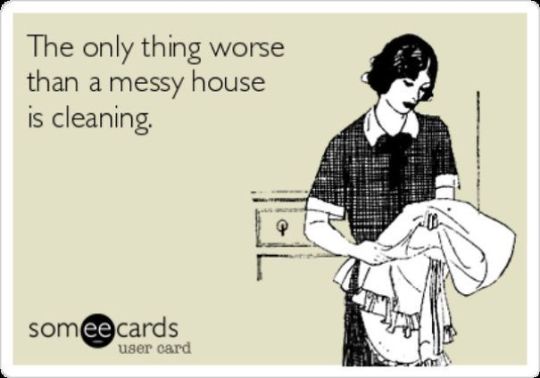
And according to psychologists, getting what we want doesn’t really make us happier. Instead, something like getting a promotion causes our happiness to spike, before it quickly returns to baseline. The psychologist Dan Gilbert writes that the purpose of our emotions is to act like a compass—to tell us which direction to go in. If you feel good, you can continue the way you are going. If you feel bad, you should probably turn—make a change. But if you get what you want and become permanently happy, your compass is now broken. It’s stuck in one direction and becomes useless.
All of this is very Buddhist, of course. Suffering is not caused by our external circumstances, but our desire to change them.
Like I said, I don’t necessarily believe in “fate” or “fortune.” But I believe this all points to something deeper that MXTX is getting at: which is that we cannot fundamentally make a better world, for the common people, or for anyone. This idea of “better” doesn’t really exist. The world is as it is. Trying to alter that is like playing God. And like Xie Lian says, “In this world, there are no true gods…”
So, what do we do? How can we survive this absurdist tragedy of life? I don’t think we can just throw up our hands and not give a shit—that way lies depression and Jun Wu-style cruelty. We cannot lose our heart. But we also can’t try to fix everything.
One thing I find a bit difficult about MXTX is she is very clear about the impossible situations our characters find themselves in, but not really clear about the solution. She seems critical of the characters’ actions (I’m thinking also of Wei Wuxian here), but what exactly does she think they should have done? In other words, what is the point?
I spent a long time thinking about this. And I realized that Xie Lian was able to get back on his feet, find happiness and make peace with himself. How did he do this? Ultimately, I see Xie Lian’s solution as having three parts: self-sacrifice, gratitude, and purpose. Which all sounds very academic and maybe not that profound on an emotional level. But hear me out. Because, in the end, I think these choices are incredibly beautiful. They are the kind of thing that make me feel like reading TGCF was actually a spiritual experience, no matter what MXTX says. That makes me admire Xie Lian and want to follow him (like the God he is).
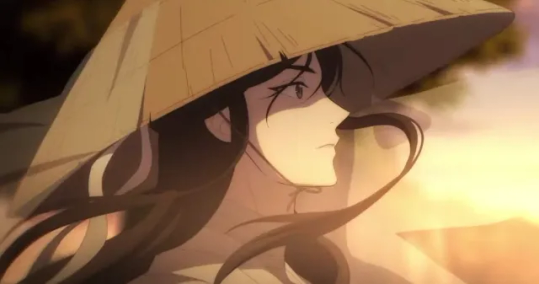
Okay so first: self-sacrifice. If fortune is limited, and the only way to make others’ lives better is to take fortune from someplace else, then there is really only one place you can take it from without hurting others—yourself.
So, part of Xie Lian’s solution is to take fortune from himself and give it to others. It’s why he asks for a cursed shackle that disperses his fortune, so that his fortune will naturally flow to those around him. It’s, of course, a very small thing. He is no longer playing God, or trying to “fix” the world on a grand scale. He is simply, in his own, quiet way, serving the common people.
My desire to give up meat and to spend more time on activism—these things feel like big sacrifices for me. And yet, they will have a very small impact on the greater situation in the world. They’re a drop in the ocean. I still want to do it, but it’s hard. It’s hard to care, or think that these things matter. Yet, this is the trade-off Xie Lian was willing to make. I really admire him for it.
I believe self-sacrifice is actually a really important, beautiful thing, that our society has forgotten the value of. We are individualistic—obsessed with our own wants. As I mentioned previously, our expectations have risen, so we buy and buy and buy. We are unwilling to rein in our consumption. I know a lot of people baulk at lifestyle changes as a solution to the climate crisis, and I agree that putting pressure on individuals instead of governments or corporations is misguided. But, first of all, there simply aren’t enough resources on earth to sustain our current levels of consumption. And, second… I don’t think we can completely let individuals off the hook. What is society anyway, but a collection of individuals? If we are going to address this thing, it’s going to take a massive movement—bigger than the civil rights movement or the works’ rights movement or the women’s movement. It’s going to take millions of people worldwide getting out of their own heads, their own lives, and concerning themselves with the greater good. That requires immense sacrifice.
Which takes me to gratitude. In order to be willing to sacrifice, you have to appreciate what you already have.
People often talk about gratitude these days as a path to mental health. Instinctively, it sounds like an uplifting, positive thing. And it is… but it also entails having a relatively negative worldview. It means remembering all the horrible things that exist in this world which we are lucky enough to avoid on a daily basis. You stepped in some dog shit? Well, that sucks, but you could have stepped into an open manhole and broken your neck! So! That’s something to be grateful for.
We are all so lucky. I’m sure everyone reading this has pains and traumas and challenges. This isn’t to diminish those, but, I hope, at least we all have at least one person to love. That’s all Hua Cheng had, and it’s what kept him going. Just one person was enough. And most of us, I hope, get to eat food every day, get to sleep in a bed, get to play video games or read novels or write poetry when we are sad. Not everyone gets those things.
Xie Lian, of course, was the king of low expectations, because he knew his future was going to be bad. He had intentionally accepted bad luck for a lifetime. So, there was no point in hoping for things to get better.
I think this attitude is best shown by his interaction with the Venerable of Empty words. The Venerable of Empty Words feeds off people’s fears. But Xie Lian didn’t really have any. When the Venerable of Empty Words warned him that his hut will collapse in two months, his response is, “Two months? If it’s still standing in seven days, then it’ll be a real miracle.” Because his expectations are so low, he’s essentially immune to fear. I can’t help but think that if you could really think this way, it would be a kind of superpower. It reminds me of the famous quote by spiritual teacher Krishnamurti, “Do you know what my secret is? You see, I don’t mind what happens.”

And so Xie Lian is okay with everything. He can sleep anywhere, crash boulders on his chest for money, not eat for three days, regularly suffer corpse poisoning, and still be okay.
Which leads to my third point: purpose. Xie Lian is able to endure such hardship because his expectations are low, but also he knows all his suffering has a purpose. “If I am to become a God of misfortune, then so be it,” he says. “As long as I know deep down that I am not.” He is okay with being laughed at or avoided for his bad luck, because deep down he knows he is doing the right thing. People can withstand a great deal if they feel their suffering has meaning. In Man’s Search for Meaning, the psychiatrist Victor Frankl’s writes about the horrors of living through a concentration camp, and how over and over, it was creating purpose that allowed him, and others, to find motivation to survive. Which I think has an important lesson for self-sacrifice. People are willing to sacrifice a lot, if they feel their sacrifice has purpose.
I get it when MXTX says that she is not a guru, and maybe it’s a lot to ask of a danmei novel to take spiritual advice from it. The book wasn’t necessarily perfect, and I do have some critiques (which I was gonna add here, but this thing is already wayyy too long). But… I do think I found something really meaningful in this story—some inspiration. I want to follow Xie Lian’s example, and live with gratitude and acceptance, while keeping my faith in doing the right thing. In other words, WWXLD! (What Would Xie Lian Do?)
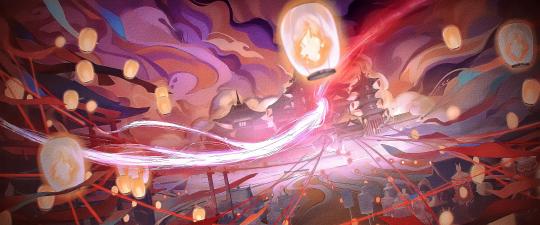
#tgcf#mxtx#heaven official's blessing#tgcf meta#tian guan ci fu#climate change#xie lian#hualian#danmei#chinese bl
81 notes
·
View notes
Text
100 days of productivity (40/100)
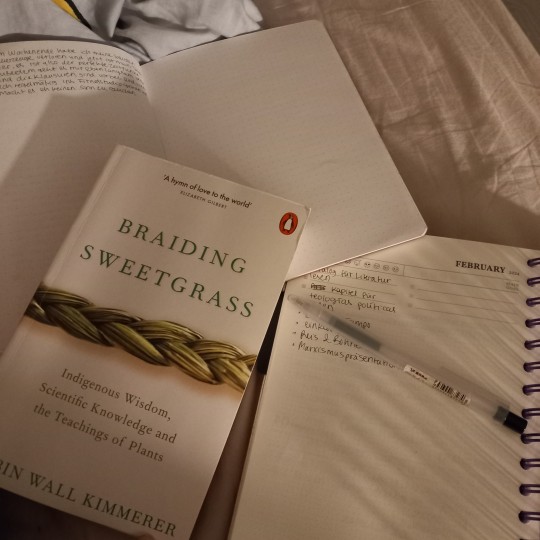
Friday, 2nd February
Today I felt really good 😊
Productivity:
Had 2 classes today (3h)
Ordered some books for university (and a novel for fun reading hehe)
Bought some groceries
Made lunch
Selfcare:
Went to the gym
Journaled
Spent friday night at home without feeling like I am too boring (it was really nice)
Planned the next few days, which helps soo much with my stress levels
Had a nap
Feeding my soul:
Conversation with online friends about spirituality
Tarot, incense, and candles at my altar
📚 Braiding Sweetgrass
🎧 The Red Text Podcast
🎧 A podcast interview with a professor of Spanish literature about Christian mysticism and her own mystical experience. It was so interesting, and we will also read some Christian mystics this semester in my religion and literature class :)
#study blog#studyblr#studyspo#study motivation#student#100 days of productivity#studying#study aesthetic#witch blog
62 notes
·
View notes
Text
Interview with Succulent Siren♠️

Where did the idea for the book ‘Powerful Secrets of the Divine Feminine’ come from?
The idea for this book began with my journey of discovering and exploring my spirituality.
Spirituality for me was like entering a wonderland where all the dogma no longer held value.
I was, and still am learning liberating and empowering knowledge about myself.
Once I began to apply this knowledge, I began to attract more money, I became more confident, I manifested a successful blog, I found my voice, I had more successful outcomes in my personal life and so much more.
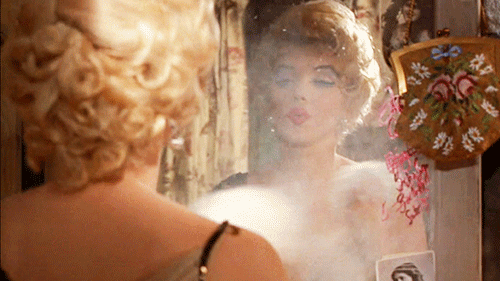
What teachings advanced your life the most?
I gained the most treasures by learning to apply what I learned about Feminine Energy.
Many women are disconnected from their Feminine Energy but if they we’re connected, they’d be able to attract so much more abundance.
So I want to share this knowledge to enlighten other people, especially women and girls, of their true power.

What message do you have for girls and women?
Like the majority of girls, I was also taught to be a ‘nice girl’ but I learned as I got older, that the ‘nice girl’ path didn’t have my best interests at heart. It was a setup for me to get walked all over by others and I refuse to live a life of misery or submission.
So instead of teaching girls to shrink, I want to remind them of their power.
I had to learn how to release my mind from shame and take my power back and there’s no better feeling than owning who you are and living free.
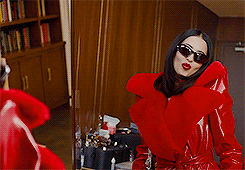
I know i’m meant to get what I want and live my dream life and I know that there’s so much more abundance to come.
I am totally obsessed with bettering myself and living in my highest potential and I strive to influence others to do the same.
Grab A Copy of the Book Here
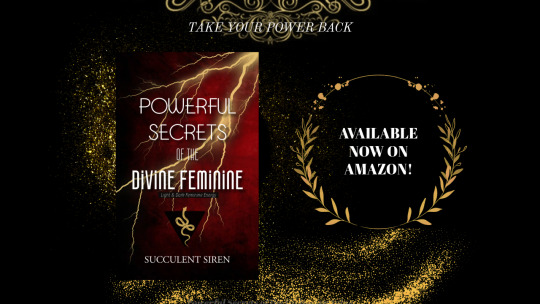
#succulentsiren#dark feminine energy#writers and poets#powerful secrets of the divine feminine#amazon best sellers#amazon books#books#kindle#divine feminine#light feminine#dark feminine#dark femininity#femininity#affirmations#inspiration#author#writer#self publishing#self publication#goddess#god#spirituality#higher self#high value woman#lessons#2024#interview#alexa demie#marilyn monroe#secrets
55 notes
·
View notes